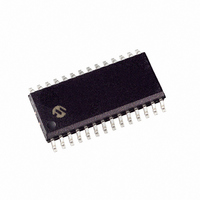PIC16F73-E/SO Microchip Technology, PIC16F73-E/SO Datasheet - Page 98

PIC16F73-E/SO
Manufacturer Part Number
PIC16F73-E/SO
Description
IC MCU FLASH 4KX14 A/D 28SOIC
Manufacturer
Microchip Technology
Series
PIC® 16Fr
Datasheets
1.PIC16F616T-ISL.pdf
(8 pages)
2.PIC16F688T-ISL.pdf
(688 pages)
3.PIC16F818-ISO.pdf
(6 pages)
4.PIC16F73-ISP.pdf
(174 pages)
5.PIC16F73-ISP.pdf
(14 pages)
6.PIC16F73-ISP.pdf
(12 pages)
Specifications of PIC16F73-E/SO
Core Processor
PIC
Core Size
8-Bit
Speed
20MHz
Connectivity
I²C, SPI, UART/USART
Peripherals
Brown-out Detect/Reset, POR, PWM, WDT
Number Of I /o
22
Program Memory Size
7KB (4K x 14)
Program Memory Type
FLASH
Ram Size
192 x 8
Voltage - Supply (vcc/vdd)
4 V ~ 5.5 V
Data Converters
A/D 5x8b
Oscillator Type
External
Operating Temperature
-40°C ~ 125°C
Package / Case
28-SOIC (7.5mm Width)
Lead Free Status / RoHS Status
Lead free / RoHS Compliant
Eeprom Size
-
Other names
PIC16F73E/SO
- PIC16F616T-ISL PDF datasheet
- PIC16F688T-ISL PDF datasheet #2
- PIC16F818-ISO PDF datasheet #3
- PIC16F73-ISP PDF datasheet #4
- PIC16F73-ISP PDF datasheet #5
- PIC16F73-ISP PDF datasheet #6
- Current page: 98 of 688
- Download datasheet (3Mb)
PICmicro MID-RANGE MCU FAMILY
6.2.1
6.2.2
6.2.3
DS31006A-page 6-4
Reset Vector
Interrupt Vector
Calibration Information
On any device, a reset forces the Program Counter (PC) to address 0h. We call this address the
“Reset Vector Address” since this is the address that program execution will branch to when a
device reset occurs.
Any reset will also clear the contents of the PCLATH register. This means that any branch at the
Reset Vector Address (0h) will jump to that location in PAGE0 of the program memory.
When an interrupt is acknowledged the PC is forced to address 0004h. We call this the “Interrupt
Vector Address”. When the PC is forced to the interrupt vector, the PCLATH register is not mod-
ified. Once in the service interrupt routine (ISR), this means that before any write to the PC, the
PCLATH register should be written with the value that will specify the desired location in program
memory. Before the PCLATH register is modified by the Interrupt Service Routine (ISR) the con-
tents of the PCLATH may need to be saved, so it can be restored before returning from the ISR.
Some devices have calibration information stored in their program memory. This information is
programmed by Microchip when the device is under final test. The use of these values allows the
application to achieve better results. The calibration information is typically at the end of program
memory, and is implemented as a RETLW instruction with the literal value being the specified cal-
ibration information.
Note:
For windowed devices, write down all calibration values BEFORE erasing. This
allows the device’s calibration values to be restored when the device is re-pro-
grammed. When possible writing the values on the package is recommended.
1997 Microchip Technology Inc.
Related parts for PIC16F73-E/SO
Image
Part Number
Description
Manufacturer
Datasheet
Request
R

Part Number:
Description:
Manufacturer:
Microchip Technology Inc.
Datasheet:

Part Number:
Description:
IC MCU FLASH 4KX14 A/D 28DIP
Manufacturer:
Microchip Technology
Datasheet:

Part Number:
Description:
IC MCU FLASH 4KX14 A/D 28SSOP
Manufacturer:
Microchip Technology
Datasheet:

Part Number:
Description:
IC MCU FLASH 4KX14 A/D 28SOIC
Manufacturer:
Microchip Technology
Datasheet:

Part Number:
Description:
IC MCU FLASH 4KX14 A/D 28QFN
Manufacturer:
Microchip Technology
Datasheet:

Part Number:
Description:
28 PIN, 7KB STD FLASH, 192 RAM, 22 I/O,
Manufacturer:
Microchip Technology
Datasheet:

Part Number:
Description:
IC PIC MCU FLASH 4KX14 28DIP
Manufacturer:
Microchip Technology

Part Number:
Description:
7 KB Flash, 368 RAM, 25 I/O 28 QFN 6x6mm TUBE
Manufacturer:
Microchip Technology
Datasheet:

Part Number:
Description:
28 PIN, 7KB STD FLASH, 192 RAM, 22 I/O,
Manufacturer:
Microchip Technology
Datasheet:

Part Number:
Description:
3.5KB Flash, 128B RAM, 18 I/O, CLC, CWG, DDS, 10-bit ADC 20 QFN 4x4mm TUBE
Manufacturer:
Microchip Technology
Datasheet:

Part Number:
Description:
3.5KB Flash, 128B RAM, 18 I/O, CLC, CWG, DDS, 10-bit ADC 20 PDIP .300in TUBE
Manufacturer:
Microchip Technology
Datasheet:

Part Number:
Description:
3.5KB Flash, 128B RAM, 18 I/O, CLC, CWG, DDS, 10-bit ADC 20 SOIC .300in TUBE
Manufacturer:
Microchip Technology
Datasheet:

Part Number:
Description:
3.5KB Flash, 128B RAM, 18 I/O, CLC, CWG, DDS, 10-bit ADC 20 SSOP .209in TUBE
Manufacturer:
Microchip Technology
Datasheet:

Part Number:
Description:
3.5KB Flash, 128B RAM, 18 I/O, CLC, CWG, DDS, 10-bit ADC 20 QFN 4x4mm TUBE
Manufacturer:
Microchip Technology
Datasheet:

Part Number:
Description:
3.5KB Flash, 128B RAM, 18 I/O, CLC, CWG, DDS, 10-bit ADC 20 PDIP .300in TUBE
Manufacturer:
Microchip Technology
Datasheet:










